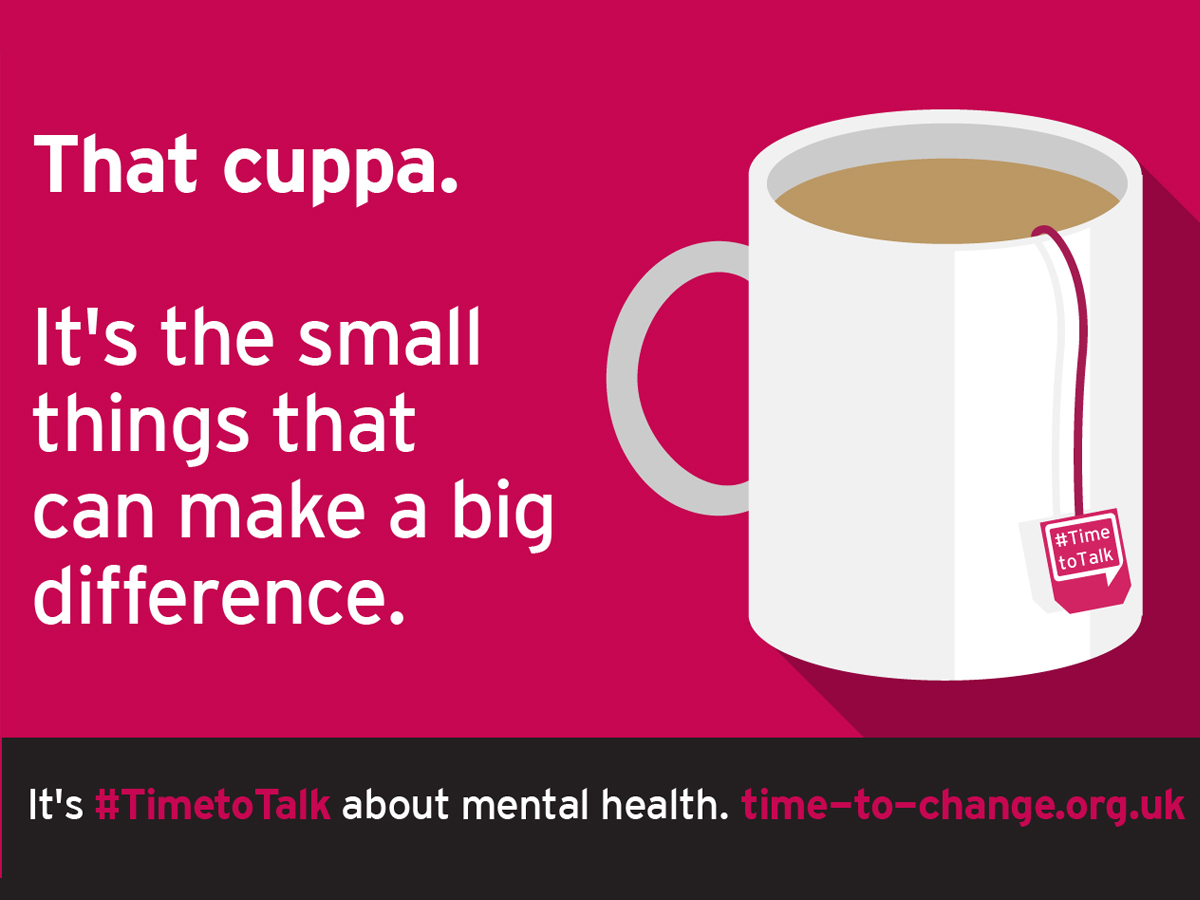Silver Linings: The Stigma Around Mental Health
Chloe Crowther introduces us to Time To Change, the mental health campaign that’s aiming to break down the stigma and discrimination around mental health.
…around a quarter of the population will experience some kind of mental health problem in the course of a year…
Most low- and middle-income countries have only one child psychiatrist for every 1 to 4 million people, according to the World Health Organisation. Fortunately in the UK, we’re lucky. Although around a quarter of the population will experience some kind of mental health problem in the course of a year (the Mental Health Foundation informs us) over the past 10 years, the number of qualified counsellors in the UK has tripled; so has the number of individuals spending time in an NHS mental health hospital (figures have increased for the first time in five years, rising 5.1 per cent to 107,765). This demonstrates that more people are seeking help for mental health difficulties and that the quantity of available help has improved.
So then, with mental health in the public consciousness, surely there are fewer people affected by mental health disorders? We’ve solved the problems, haven’t we?
…nearly three in four young people fear the reactions of friends when they talk about their mental health problems.
Have we? As more people ‘come out’ about the state of their mental health, many others turn to tormenting them for ‘being different.’ Time to Change has found that nine out of ten people with mental health problems experience stigma and discrimination, whilst nearly three in four young people fear the reactions of friends when they talk about their mental health problems
People are surprisingly ignorant about mental health. When asked to define it, blanks are often drawn. Even mental health charities – the experts themselves- struggle to explain, in plain english, what it is.
The World Health Organisation describes mental health as ‘a state of well-being in which every individual realises his/her potential’. This is a vague definition: it could refer to a philosophical epiphany, but it doesn’t sound especially scientific. It is too general; ‘well-being’ is an ambiguous term and ‘potential’ makes it sound like humans are merely means to an end, a notion which would probably only depress mental health sufferers further.
The World Health Organisation describes mental health as ‘a state of well-being in which every individual realises his/her potential’
The Mental Health Foundation offers a similarly generalised definition: ‘It’s [mental health] a way of describing how we feel and how we cope with our emotions.’ Mental Health Ireland cites mental health as being, ‘not just the absence of mental illness’.
What do all these definitions have in common? They all offer definitions of the concept of mental health. Because mental health is an umbrella term – involving a broad spectrum of illnesses, disorders and states of mind –it is therefore difficult to define accurately. This is where the problems begin, as it is human nature to fear what we do not comprehend. And it is that fear which drives us to bully, to torment, even to torture those of us suffering from ‘poor mental health’.
Ignorance breeds contempt and contempt breeds stigma.
Ignorance breeds contempt and contempt breeds stigma.
One in four Britons will experience some kind of mental health problem in the course of a year, says the Mental Health Foundation. Ten per cent of children have a mental health problem at any one time. Suicide rates show that British men are three times as likely to die by suicide than British women. Yet we ignore the statistics, even though they represent human beings who are crying out for society’s help, not judgement. For instance, according to Time to Change, 63% of televised portrayals of mental health sufferers used ‘pejorative, flippant or unsympathetic’ terms such as “crackpot”, “a sad little psycho”, “basket case”, “where did you get her from?”, “Care in the Community?” and “he was looney tunes”‘.
…women are more likely to have been treated for a mental health disorder than men.
Some people do get help – women are more likely to have been treated for a mental health disorder than men. (29% compared to 17%, the Mental Health Foundation.) But this is probably a result of the stigma attached to the masculine ideal – that it’s somehow a sign of weakness to get help for your problems.
Moreover, even if these people do seek help, they might not be able to get it, either because they can’t afford it or, worse still, because the service provider can’t. Despite all the changes mentioned earlier, only two percent of government funding is currently spent on mental health.
It’s time that changed.
Many other charities already exist to support people with their mental health.
People everywhere are waking up to mental health: despite the lack of definitive ‘cures’ for mental health disorders (there is no magic wand to wave, as it is still a progressive medical field) there are silver linings to these issues. And they come in the form of raising public awareness, of educating people.
In the UK, steps are being taken to break down stigma. #TimeToTalk, the latest campaign run by Time To Change (‘England’s biggest programme to challenge mental health stigma and discrimination’, ) is trying to get people to pledge to show their support for friends, families and colleagues. It’s really easy to do – just go to their website to pledge.
Bristol’s Off the Record, Mind, Rethink Mental Illness, Samaritans, Childline, the Mental Health Foundation and the SANE Mental Health are just a few examples.
Many other charities already exist to support people with their mental health. Bristol’s Off the Record, Mind, Rethink Mental Illness, Samaritans, Childline, the Mental Health Foundation and the SANE Mental Health are just a few examples. It’s brilliant that there’s already so much support out there.
But more needs to be done.
Unlimited support should be made available to people who suffer from mental health disorders. This includes counselling, peer support groups and helplines, GP appointments/NHS appointments as needed. Also, support systems should be put in place to help the friends and family of mental health sufferers. After all, it’s tough to watch someone you care about suffer, especially when you don’t know how to help them.
It’s vital that society tackles mental health disorders, before it’s too late.
It’s vital that society tackles mental health disorders, before it’s too late. A good place to start would be establishing free, friendly and confidential support groups in schools and youth clubs. Staff and other students can encourage more open discussions about mental health in class. Lessons can be planned that encourage people to break through the negative stigma surrounding the subject.
The bottom line is, there’s plenty that can be done about mental health disorders. The government can make a start by donating more money to facilities and organisations that deal with sufferers and their loved ones. The issues can be addressed from an early age, so that future generations can know what to look out for and how to cope with regards to mental health disorders. This is a subject that I am personally interested in; as part of my work with the charity, Envision UK, I will be tackling this issue.
Mental health disorders are important subjects that require public action to help to overcome them, or at the very least make life for mental health sufferers and their loved ones that little bit better.
Mental health disorders are important subjects that require public action to help to overcome them, or at the very least make life for mental health sufferers and their loved ones that little bit better.
If you suffer from a mental health issue yourself, you will have bad days, dark days, in which it feels like life will never be good again. But sometimes, you will have good days…I hope that, with more funding and awareness, you will have good days the majority of the time.
Here’s a reminder of some of the local and national organisations that can help: Off the Record, Mind, Rethink Mental Illness, Samaritans, Childline, the Mental Health Foundation and the SANE Mental Health
Let us know what you think: how can we break down discrimination around mental health @rifemag






